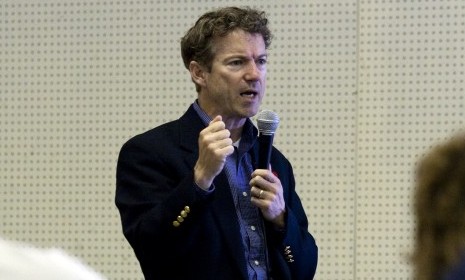Was Rand Paul's civil rights gaffe intentional?
The Kentucky Republican's controversial remarks about race were a calculated move to harness the Tea Party vote, says Jason Whitlock in the Kansas City Star

A free daily email with the biggest news stories of the day – and the best features from TheWeek.com
You are now subscribed
Your newsletter sign-up was successful
Rand Paul, the GOP candidate for Senate in Kentucky, generated shockwaves when he suggested he might have voted against the Civil Rights Act of 1964. Paul was forced into a humiliating U-turn after lawmakers from both parties condemned the remarks, which were widely written off as a blunder by a eccentric liberatarian out of touch with political reality. But Jason Whitlock at the Kansas City Star disagrees with that assessment, suggesting Paul made the controversial statements as a "calculated, bold, political-branding move" to stamp his independent, man-of-the-people credentials on this election." "Paul, a doctor, is not stupid, nor is he a political novice," says Whitlock. To win November's election he needs to raise his profile, and stir up passion. This calculated "mistake" did both:
"Rand Paul did not hurt his political brand by taking a day to criticize legislation that provided black people genuine American freedom. He's running for office in Kentucky, not New York. He's operating in a political climate in which both the anti-Obama outrage and pro-Obama blind support are fueled in part by race.
Paul chose a side. He let the 24-hour news cycle turn him into a household name, and then he retreated, claiming to be a victim of the liberal media and putting out a statement clarifying his position on civil rights.
The Week
Escape your echo chamber. Get the facts behind the news, plus analysis from multiple perspectives.

Sign up for The Week's Free Newsletters
From our morning news briefing to a weekly Good News Newsletter, get the best of The Week delivered directly to your inbox.
From our morning news briefing to a weekly Good News Newsletter, get the best of The Week delivered directly to your inbox.
...This was no mistake made by a political amateur. And I don’t believe Paul will pay a negative political consequence for it. The bet here is that he’ll benefit."
Read the entire article at the Kansas City Star.
A free daily email with the biggest news stories of the day – and the best features from TheWeek.com
-
 American universities are losing ground to their foreign counterparts
American universities are losing ground to their foreign counterpartsThe Explainer While Harvard is still near the top, other colleges have slipped
-
 How to navigate dating apps to find ‘the one’
How to navigate dating apps to find ‘the one’The Week Recommends Put an end to endless swiping and make real romantic connections
-
 Elon Musk’s pivot from Mars to the moon
Elon Musk’s pivot from Mars to the moonIn the Spotlight SpaceX shifts focus with IPO approaching
-
 The billionaires’ wealth tax: a catastrophe for California?
The billionaires’ wealth tax: a catastrophe for California?Talking Point Peter Thiel and Larry Page preparing to change state residency
-
 Bari Weiss’ ‘60 Minutes’ scandal is about more than one report
Bari Weiss’ ‘60 Minutes’ scandal is about more than one reportIN THE SPOTLIGHT By blocking an approved segment on a controversial prison holding US deportees in El Salvador, the editor-in-chief of CBS News has become the main story
-
 Has Zohran Mamdani shown the Democrats how to win again?
Has Zohran Mamdani shown the Democrats how to win again?Today’s Big Question New York City mayoral election touted as victory for left-wing populists but moderate centrist wins elsewhere present more complex path for Democratic Party
-
 Millions turn out for anti-Trump ‘No Kings’ rallies
Millions turn out for anti-Trump ‘No Kings’ ralliesSpeed Read An estimated 7 million people participated, 2 million more than at the first ‘No Kings’ protest in June
-
 Ghislaine Maxwell: angling for a Trump pardon
Ghislaine Maxwell: angling for a Trump pardonTalking Point Convicted sex trafficker's testimony could shed new light on president's links to Jeffrey Epstein
-
 The last words and final moments of 40 presidents
The last words and final moments of 40 presidentsThe Explainer Some are eloquent quotes worthy of the holders of the highest office in the nation, and others... aren't
-
 The JFK files: the truth at last?
The JFK files: the truth at last?In The Spotlight More than 64,000 previously classified documents relating the 1963 assassination of John F. Kennedy have been released by the Trump administration
-
 'Seriously, not literally': how should the world take Donald Trump?
'Seriously, not literally': how should the world take Donald Trump?Today's big question White House rhetoric and reality look likely to become increasingly blurred